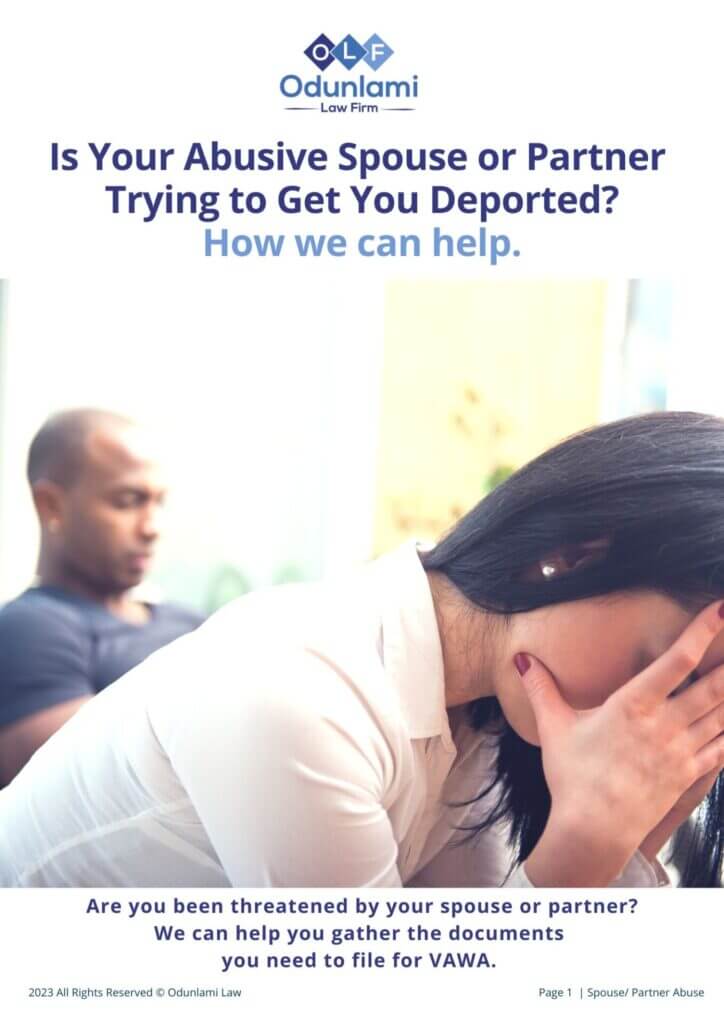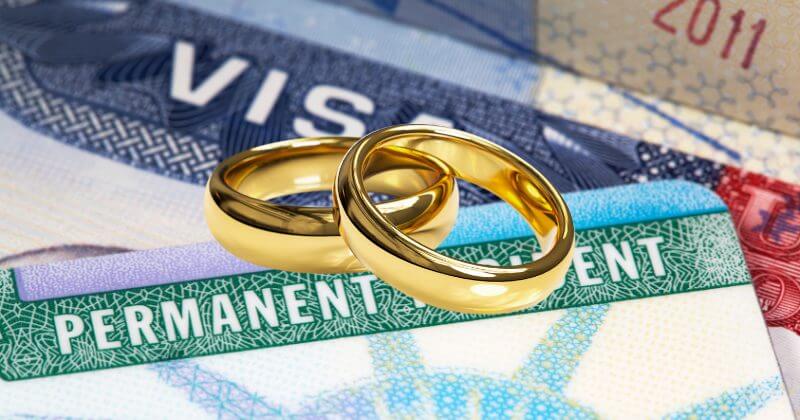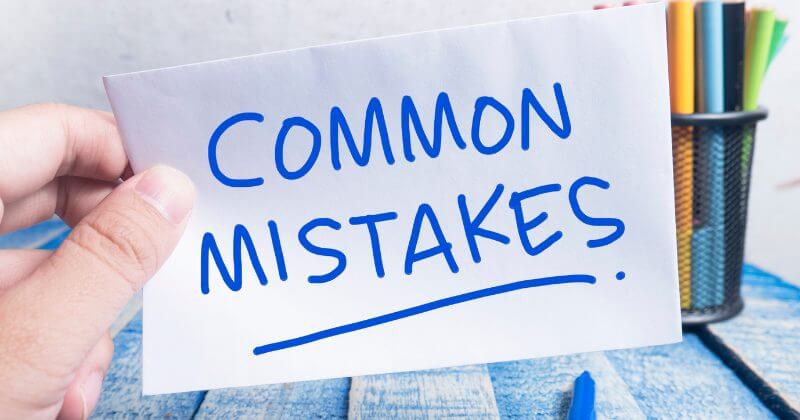Understandably, sometimes relationships don’t work out for specific reasons. However, if you are an immigrant in a relationship with a United States citizen and you fear that your spouse is trying to prevent you from getting your green card, you may wonder if your spouse or partner can get you deported. It may be shocking to hear, but if you feel like your spouse is trying to prevent you from obtaining your green card, threatening to call USCIS, or saying they will not attend your green card interview, this is considered a verbal and threatening type of abuse. So, can your abusive spouse or partner get you deported?
Our immigration law firm will break down what your options are. However, it’s essential to understand that the answer is no. Your spouse or partner can not get you deported.
This abuse can leave you scared and unsure of what steps to take. Understandably you have left everything and everyone you have known to come to the United States. If you have children in the United States, you may be scared of being deported and away from your children. Again, this control or power over someone is a sign of abuse. If you are in the situation, there is something you can do.
Watch the video: Can your Abusive Partner or Spouse get you deported?
If you fear your abusive spouse or partner is trying to get you deported, here is what you should do.
The solution is VAWA. VAWA stands for Violence Against Women’s Act, and that name can be confusing because when you hear violence, you think it has to be something aggressive. However, VAWA does not require you to be physically abused to be able to apply for VAWA. There are different types of abuse. It can be emotional, psychological, verbal, or financial. Also, VAWA is not just for women. Men, children, parents, and the LGTBQ+ community can file a VAWA self-petition if they meet the requirements.
In many VAWA cases, our VAWA clients think they need certain documents or physical evidence of abuse to file for VAWA. For example, your spouse or partner will not give you access to certain documents, bank accounts, or tax statements, and you might not be on a lease or mortgage agreement. However, what is great about VAWA is that you do not need all those documents, proof of physical abuse, or your spouse or partner to petition for VAWA. Unfortunately, part of verbal abuse is having total control.
How can you petition for VAWA and obtain your green card?
In order to petition for VAWA, you need to be able to prove the following;
- That your abusive spouse or partner is a green card holder or United States citizen.
- Prove that you have lived with them at some point.
- Prove that the relationship was a “bona fide” relationship.
- Able to prove that you were a person of good moral character. (Write a declaration or statement of your story.)
However, it can be challenging to navigate this journey alone. Our experienced VAWA attorneys understand the fear of doing this alone. In addition, you might fear the future and what happens when your spouse, partner, friends, and community find out. So, it is essential that you contact an experienced VAWA immigration attorney who can help you find the evidence you need and help you put your case together to file for VAWA. It is important to remember that;
- VAWA is confidential; your spouse will not find out
- VAWA is also not meant for your spouse to get in trouble with the law
How to prove your abusive spouse or partner is a United States citizen or green card holder
Trying to get proof that your abuser is a United States Citizen or a green card holder can seem impossible for many abuse victims. However, an experience VAWA attorney will be able to obtain the documents you need. Most people have what is called a digital footprint. It is infrequent to find someone who has no digital footprint at all. Here are the ways that you can find the documents you need.
- Check public records
- Check voting records
- Check the Freedom of Information Act (FOIA)
- Access to a social security number, passport, birth certificate, and marriage certificate and being able to give that information to USCIS
How to prove you lived together with your abuser
You must have qualifying evidence when you file for VAWA, including proof that you lived with your abuser. Proof of living together can be before or after your marriage. Your evidence can be;
- Affidavits from a landlord or people you know
- Utility bills with both your names
- A lease agreement or mortgage
It is important to note that according to a recently passed law, you do not need to live with your abuser for a specific time. As long as you can show that you live together at some point, complete that residency requirement.
How to prove the relationship was a "bona fide" relationship.
You must present all the evidence to show you had or have a real marriage. A “bona-fide” marriage means that when you enter the marriage, you intend to be with that person and not for immigration. In addition, you must be able to show evidence of your relationship and how you are related to your abuser. This evidence includes a marriage certificate, birth certificate, or divorce decree.
There are various ways to prove your marriage, including;
- Joint bank account
- Jointly on a mortgage or lease
- Life insurance beneficiary
- Health insurance
- Car insurance
- File your taxes jointly
- Photos of memories and experiences and photos of other people
- Your social media should reflect your marriage. USCIS will check your social media.
- Proof of shared experiences with your spouse
**If USCIS finds your marriage fraudulent, you get denied with a 204c. Unfortunately, this denial means It can prevent you from ever getting a green card.
How to prove you are a person of good moral character.
You will need to get an FBI report showing that you have never been arrested or if you have been arrested for what you were arrested for.
It’s important to remember that all crimes are not equal. You can also have people in your community write letters on your behalf, proving you are a person of good moral character.
Write a declaration or statement of your story.
You must have a declaration of your story. You need to write a compelling written statement. There are a lot of things you need to include in your written statement, including the following;
- How did you meet your spouse?
- What was the relationship like in the beginning
- What changed in the relationship
- What type of abuse did you face?
- Do you have any witnesses or documented evidence, including a temporary restraining order, police report, or hospital reports
- A letter or diagnosis from a psychologist
- A written affidavit from your church
*You need to explain everything that happened to you in detail.
This article: How to Write Your Personal Declaration Letter for VAWA Self-Petition, can walk you through the steps.
If you are trying to obtain your green card and your spouse is threatening to deport you, threatening to not show up to your immigration interview, and refusing to help you, don’t hesitate to contact our immigration law firm for a VAWA consultation.
If you have additional questions or are looking for immigration services, please get in touch with the Odunlami Law Firm at 973-993-1900 or email us at iao@odunlamilaw.com.
Subscribe To Download Our Free Resource EBook
Is Your Abusive Spouse or Partner Trying to Get You Deported?

Are You Looking For An Experienced Immigration Law Firm?
We Work With Clients Locally, Nationwide, And Internationally.
If you have any additional questions about obtaining your green card or are looking for immigration services, don’t hesitate to contact the Odunlami Law Firm at 973-993-1900 or email us at support@odunlamilaw.com.
We can help you will your immigration needs.
Areas of Immigration Law:
Naturalization (Citizenship) Application
Immigrant Relative Petitions
Fiancé Visa Applications
Adjustment of Status and Consular Processing
Criminal Consequences and Deportation Defense
Violence Against Women Act (VAWA) Application
Special Immigrant Juvenile Status
Green Card Renewals
Temporary Work Visas
Temporary Protected Status
Deferred Action for Childhood Arrivals
Waivers



